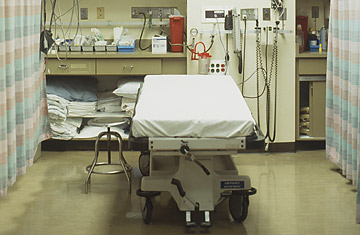
A hospital ward in Britain
In recent weeks, opponents of Barack Obama's health-care-reform plans have criticized Britain's National Health Service (NHS) in an effort to counter the President's proposals for greater government involvement in health care. Republican Senator Chuck Grassley of Iowa suggested that his Democratic colleague Edward Kennedy would have been left to die in Britain because doctors would have refused the 77-year-old treatment for his brain tumor, and former House of Representatives Speaker Newt Gingrich wrote in an article that British health care is run by "Orwellian" bureaucrats who put a price tag on life. Meanwhile, the lobby group Conservatives for Patients' Rights (CPR) has been running scare ads with horror stories from British patients on its website. TIME takes a look at what the NHS is really all about.
What is the NHS?
The NHS is a rare example of truly socialized medicine. Health care is provided by a single payer — the British government — and is funded by the taxpayer. All appointments and treatments are free to the patient (though paid for through taxes), as are almost all prescription drugs. The maximum cost of receiving any drug prescribed by the NHS is $12.
How was it formed?
The NHS officially came into being in July 1948, in the wake of World War II, to replace an inadequate system of volunteer hospitals that had, during the war, come to rely on government funding. Doctors and conservative politicians vehemently opposed the NHS in the run-up to its formation, using many of the arguments that opponents of greater government involvement in the U.S. cite today. According to Geoffrey Rivett, author of From Cradle to Grave — The First 60 Years of the NHS, the then head of doctor's body the British Medical Association (BMA), Charles Hill, gave a radio address in 1948 in which he asked, "Do you really want the state to be your doctor?" Today, the BMA is a champion of the NHS and resists any privatization initiatives. In a statement on Aug. 14, BMA chairman Dr. Hamish Meldrum said, "The NHS is not perfect. But the market-style philosophy of the U.S. is a lesson we could do well without."
How does NHS health care compare with U.S. health care?
Like most developed countries, Britain ranks above the U.S. in most health measurements. Its citizens have a longer life expectancy and lower infant mortality, and the country has more acute-care hospital beds per capita and fewer deaths related to surgical or medical mishaps. Britain achieves these results while spending proportionally less on health care than the U.S. — about $2,500 per person in Britain, compared with $6,000 in the U.S. For these reasons, the World Health Organization (WHO) ranked Britain 18th in a global league table of health-care systems (the U.S. was ranked 37th). However, there are measures by which the U.S. outperforms Britain: for instance, the U.S. has lower cancer mortality rates.
Does private health insurance exist in Britain?
Yes, and it works in a similar way to health insurance in the U.S. Many employers offer private health-insurance plans as a perk to workers — a minority of patients opt out of the NHS system to receive their medical treatments privately. Private patients can choose their specialists and avoid waiting lists for non-emergency procedures; NHS patients wait an average of about eight weeks for treatments that require admission to a hospital, four weeks for out-patient treatments and two weeks for diagnostic tests. While NHS patients have a choice of hospitals, they cannot always choose their specialist.
